Baseballs Autographed By GOP Presidential Candidates: A Survey
Baseballs Autographed By GOP Presidential Candidates: A Survey
by Abe Sauer
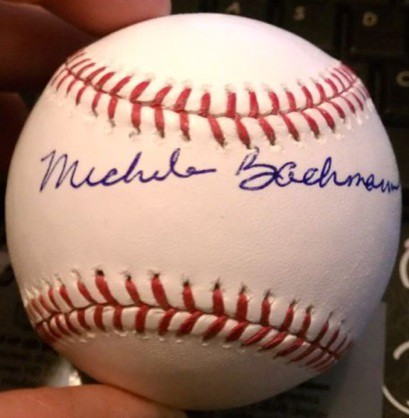

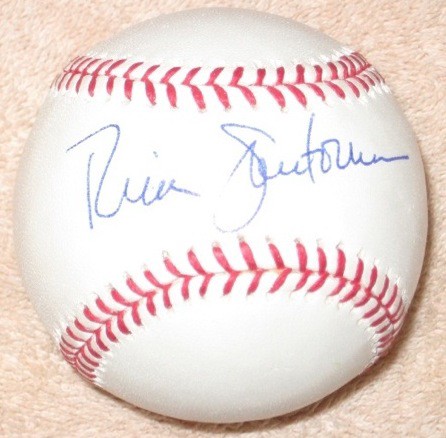
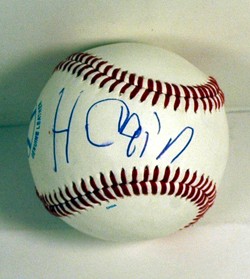
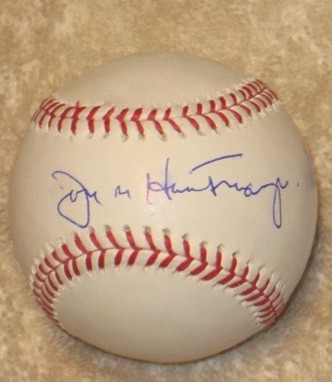
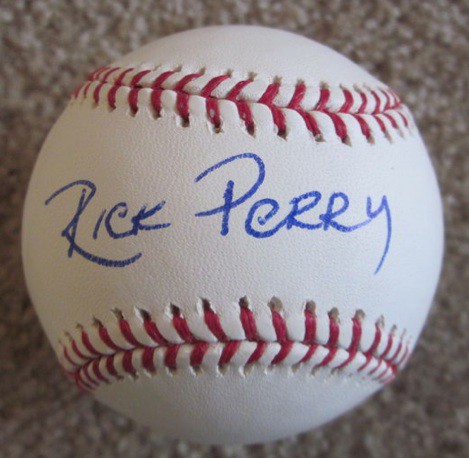


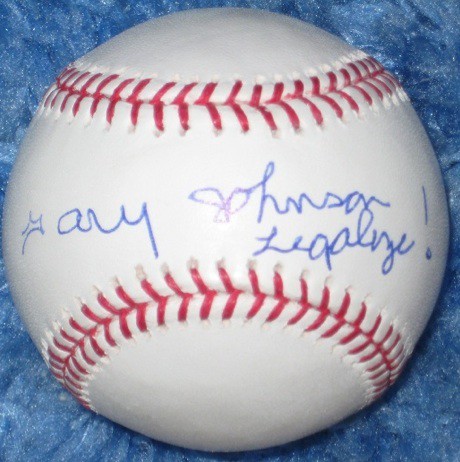
And the “wild cards”:

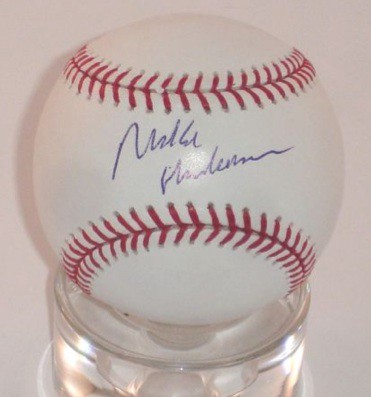
Finally, USA!
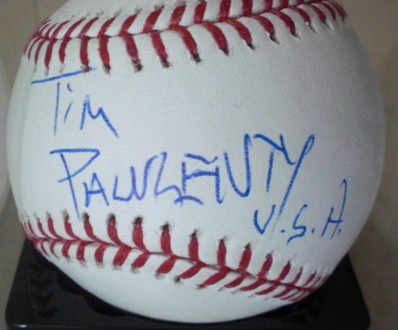
All baseballs available on eBay.
Abe Sauer can be reached at abesauer at gmail dot com. He is on Twitter.
New E-Bookstore Has Best FAQ Ever

Hey hey, it’s a book club! And this is how it works. There’s a celeriac metaphor in there for you.
Can You Fake A Blush?
If you want to scam someone into trusting you, you should totally pretend to be embarrassed around them.
Two Versions Of How LL Cool J Got Signed To Def Jam Records
“As soon as we finished the demo, me and Rick played it for Russell. I remember sitting on a pillow because Russell didn’t have chairs in his office at 1133 Broadway. Russell looked at me then asked Rick, ‘Who’s this guy smilin’ at?’ He was smiling, too. Until then, I’d never heard of him. All I knew was that he was behind that desk and had something to do with my dream.”
— LL Cool J remembers the time he and Rick Rubin brought his first song, “I Need a Beat” for Russell Simmons to hear. Part of GQ’s excerpt from Bill Adler’s forthcoming oral history, Def Jam Recordings: The First 25 Years of the Last Great Record Label
. But I will always prefer to believe the fictionalized version from Krush Groove.
Bear Does Bad Thing
This will make you cringe: “You just hear the bear chomp on the back of your head…”
Why Former Guns N' Roses Bassist Duff McKagan Is Such A Likeable Dude
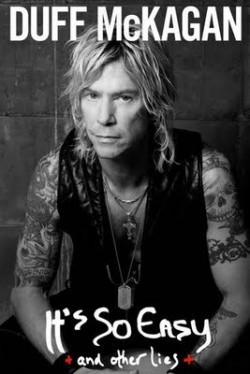
Duff McKagan was 15 when he met Kim Warnick of Seattle punk band the Fastbacks. While giving him a ride home from school, she mentioned that her band might need a drummer. “Guitar, drums, bass, whatever, I’ll join!” writes McKagan with the kind of tractable enthusiasm that makes his new memoir, It’s So Easy (And Other Lies) (out today), a fun and heartening read. After dropping out of the local alternative high school (where to show up for half an hour every two weeks “proved too great an obligation”) and drifting in and out of trouble with drugs and the police, Duff moved to Los Angeles in 1983 with little in the way of a plan but the vaguest outline of a life in music — but not a career, as he points out, saying it was never his intention to make a living. Yet that’s what he did, somewhat miraculously becoming one of the founding members of Guns N’ Roses (he played bass).
The book describes the transformation of five penniless drug addict/musicians scraping by in L.A. into a World Brand of bad-boy drug addict/musicians within just a few years. While all of the rock clichés are there — serious partying, sex, dissension, power struggles, addiction, recovery, relapse, sleazy record-label executives and so on — McKagan’s sense of humor and unpretentious punk-rock ethos make him seem like the opposite of a rock star (itself an expression he explicitly disavows), and I never stopped rooting for him. Herewith, some of my favorite quotes from the book.
On GN’R’s first show in Seattle, after their car breaks down: “‘Let me get this straight’,” he said. “‘You guys are fucking hitchhiking to a gig — a thousand miles away?’”
On Sly Stone: “Was the great Sly Stone living the good life, jamming in a home studio tucked away somewhere in his sprawling mansion? Nope, he was sneaking past my girlfriend to smoke crack in my bathroom.”
On early marketing: “Other bands had mailing lists, but one of the secrets to GN’R’s success was how much time and effort we spent building and maintaining ours.”
On GN’R’s influences: “Axl was into Nazareth, Queen, and the Ramones. Slash was the Aerosmith guy. Izzy brought a no-pretense rock vibe — Stones, Faces, New York Dolls, Hanoi Rocks. Steven was a San Fernando Valley metal guy with a soft spot for the soaring harmonies of 1960s vocal music. I brought in more of the funkier, groove stuff and the punk-rock ferocity.”
On things taking off on the L.A. club circuit: “When things are working and you’re seeing progress, it kicks major fucking ass.”
On playing a frat party: “Axl’s assless chaps may have had something to do with our tepid reception. Still, free beer.”
On their first meeting with David Geffen: “As we were hanging out in the lobby, employees coming and going didn’t realize we were a band — they thought we were street people.”
On GN’R’s first song-writing split: “Since it was so difficult to say who had done what with our songs, we finally agreed to split everything equally across the board. Our lawyer enshrined it in writing — and thank God for that.”
On Triumph: “I hated Triumph.”
On attending a funeral for a friend who overdosed on heroin: “As he eulogized yet another overdose victim, Joe himself was clearly nodding out.”
On their first real tour: “We had a tour bus! We had a couple of real hotel rooms! And catering! Fuck, yes!”
On why GN’R wasn’t a metal band: “Oh, and also we didn’t write songs about elves and demons and shit.”
On his time in Chicago: “I did, however, have one epiphany in Chicago: cocaine was a nice supplement to my drinking. On cocaine, I could now drink twice as much as I had before. Fucking brilliant.”
On Mick Jagger: “Mick was cool, but his spare sneakers, I’m afraid, were not.”
On starting shows late, which led to riots during the Use Your Illusion tours: “As the fans became more and more upset about the late starts, it dawned on me that they were upset because they had to go to work or school the next day or had a babysitter at home watching their kids.”
On playing the Freddie Mercury memorial show drunk: “That’s right: Duff McKagan, king of beers, viscount of vodka, count of coke. Champion of the world. Asshole.”
On discovering books (and Hemingway) post-drugs: “In my new and lonely world of desert-island sobriety, I was at last connecting with something. If I was not yet finding my place in the world, I was at least finding places and ideas and people I could relate to, despise, or aspire to in these great books.”
On going back to college: “From my experience, once you were pegged as a rock guy, people just assumed that you were either brain-dead or off high-flying on a private jet with hookers and cocaine. (Or both.) While I had definitely been guilty of the aforementioned clichés, in that classroom I found — don’t laugh — a love of academia.”
On meeting with Clive Davis, who signed Velvet Revolver, the post-GN’R band McKagan started with Slash: “Another interesting aspect of these meetings was that I found I did in fact understand the lion’s share of what was going on financially with the band… People took me more seriously in business meetings. Cool shit. Sometimes I looked into the eyes of industry types and saw a flash of panic. Shit, I wonder if Duff knows more than I do.”
On Scott Weiland, lead singer of Velvet Revolver: “Then Scott decided he wanted a bigger share of the publishing rights — because he’d written all the lyrics. Oh boy. This was typical stuff where I’d come from: success bred greed and megalomania.”
On writing on the Internet: “It may sound like a bit of a stretch, but it struck me as very punk rock — breaking down the barrier between artist and audience; bringing me and the readers face-to-face, if only virtually; turning readers into writers by allowing comments. I even made sure to invite my harshest critics (at least those brave enough to post their whereabouts) to come shake hands whenever I passed through their towns with Loaded.”
For those in New York City: McKagan will be appearing tonight at the Strand in conversation with David Fricke of Rolling Stone.
Matthew Gallaway lives in Washington Heights and is the author of The Metropolis Case.
David Lynch's "On the Air," Episode One
God bless Network Awesome for digging up episodes of “On the Air.” Picture it! 1992! It was the much-hyped return of David Lynch to television! We marked our paper calendars and came home early, because if you missed a TV show then, you missed a TV show. We were, let’s say, floored. Quite soon, it disappeared entirely and we were sad. (via, via)
Don't You Wish You Looked Just Like Cheryl Tweedy?
Don’t You Wish You Looked Just Like Cheryl Tweedy?
by Emma Garman
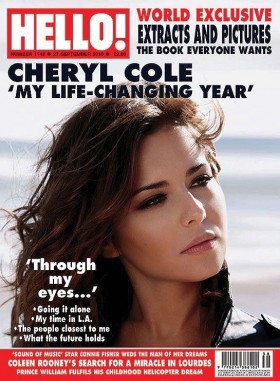
A column dedicated to explaining Britain’s manufactured celebrities to an American audience.
Friends of civilization, believers in freedom, supporters of self-serving celebrity visits to war zones, please brace yourselves for some disturbing news: al-Qaeda has a new enemy. She’s younger and perkier than The West, she’s a better dancer than The Jews, and she owns more jewelry than the Queen of England and Rudy Giuliani put together.
Wait, I sense your skepticism, but allow me to elaborate. The inflamer of whom I speak is a 28-year-old from the North-East of England by the name of Cheryl Cole. Ms. Cole, née Cheryl Ann Tweedy, is currently known to the American populace merely — if at all — as the controversially deposed judge of Fox talent show-cum-humiliation rite “The X Factor,” on whose adjudication panel she was replaced, after appearing in only a couple of episodes, by that flat-ironed hussy Nicole Scherzinger. But to put matters into their proper perspective, in her native UK Cheryl is unparalleled in media ubiquity and venerated as a platinum-selling recording star, erstwhile WAG, and undisputed national treasure. In the passionate words of artist Lee Jones, who immortalized Cheryl in a pop-art portrait, she’s “a new icon of popular culture for the 21st century, a beacon of light in these bleak times.”
None of which, alas, has prevented the jihad now placed on Cheryl’s glossy head thanks to her visit last month to Afghanistan, where she donned some fetching fatigues, posed for photos with British soldiers, and gamely participated in a “mock gun battle” — prompting fomenting Muslim cleric Anjem Choudary to warn in the pages of The Sun that the Geordie sweetheart “will only have herself to blame for repercussions on her security,” and that the famous “are not beyond the reach of al-Qaeda and the mujahideen.” Chilling, and coming on the heels of Cheryl’s ignominious public usurpation by a former member of — sorry, my fingertips actually recoil from typing the words — the Pussycat Dolls, it must have left her feeling rather beleaguered.

Rest assured, though, that our girl will be handling the situation bravely: she’s nothing if not a fighter (on which much more later). Neither is she unschooled in the art of enmity, owing primarily to an enduring discord with fellow British popstrel Lily Allen, for whom an uncanny impersonation of her peer and rival’s Newcastle accent is somewhat of a pastime.
Before we go on, a disclaimer: in discussing Cheryl’s adversaries, this column does not wish to place the carping of a moderately talented attention-seeker such as Lily on a par with the menacing and politically agitating tactics of a religious extremist. Clearly, a celebuspawn pop star who’s modeled for Chanel and hosted her own talk show is an enemy of a far mightier magnitude. For confirmation we only need look to our globally mandated arbiter of human worth, Twitter, where Lily has approximately 3 million more followers than Anjem. As Henry Ward Beecher said, “She is greatest whose strength carries up the most hearts by the attraction of her 140 character remarks about cooking shows.”
And so to the Cole-Allen feud, which has long played out in the press and across the Internet. Like the Thirty Years War, no one can authoritatively ascribe a single origin to the two’s mutual antipathy, but if an inciting event must be identified for the history books, let us say it was Lily’s composing of a song in 2006 entitled “Cheryl Tweedy” with the plaintive refrain “I wish I looked just like Cheryl Tweedy.” As soon as the innocent subject of the ditty confessed to being flattered, Lily blithely announced to the world: “I don’t want to look like Cheryl Tweedy. … It’s meant to be ironic.”
Irony aside, in actuality the song served as a ringing endorsement of Cheryl’s fame, in the same way that in the US, one’s true arrival as a celebrity might be marked by, say, In Touch Weekly invoking doctored photographic proof of an eating disorder. At the time, Cheryl was a few years into her career as one fifth of Girls Aloud, a band created in 2002 on another televised singing tournament, “Popstars: The Rivals.” On the show, members of the public auditioned to join an all-girl or all-boy band, which then competed for the coveted Christmas number-one slot of the UK singles chart. Girls Aloud won and became hugely popular, releasing two hit albums and several number-one singles, including “The Promise”” and the Pretenders cover “I’ll Stand By You,” while the boy band sank without a trace (or at least, I can’t even remember what they were called and I don’t care to look it up). Girls Aloud went on hiatus in 2009, enabling Cheryl to launch a successful solo career, which so far has yielded two number-one albums, “3 Words” and “Messy Little Raindrops.”
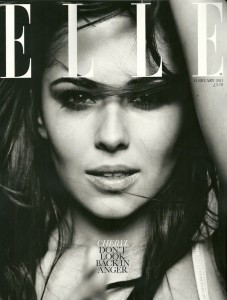
When Cheryl auditioned for “Popstars: The Rivals,” she was a 19-year-old waitress with crooked teeth and, frankly, an average singing voice (which you should judge for yourself), but possessed of a beauty that, then as now, reduced men to blathering idiots. During her first performance before the judges, when she performed a ballad from the oeuvre of harmonizing troupe S Club 7, veteran record producer Pete Waterman betrayed no sign that he’d even heard her sing, interrupting her final shaky warble to tell her “you have the most beautiful hair and skin I think I’ve ever seen,” before inarticulately marveling to the other panelists that Cheryl was “gorgeous…you’d need to be dead if you didn’t think she was stunning, my God.” Recently, Waterman’s view was echoed by no less an authority on female pulchritude than Justin Bieber, who soulfully declared: “I really think she is the most beautiful woman, not just in showbiz but in the world.”
’Twas ever thus: Cheryl might have grown up desperately poor on grim council estates ravaged by crime and heroin, wearing hand-me-downs and not knowing if she’d have any dinner, but her mother Joan made sure young Cheryl’s looks got her noticed. She modeled in catalogues, appeared in TV commercials, and won various beauty contests including “Bonniest Baby,” “Best Looking Girl in Newcastle,” and “Most Attractive Girl at the MetroCentre” — the latter triumph being, she told Piers Morgan in a TV interview, “the proudest day of me life!”
As well as pushing Cheryl into the spotlight, Joan — who has four other children, Cheryl’s younger brother, Garry, and her older half-siblings, Joseph, Gillian and Andrew — also instilled in her the importance of being tough. Herself a formidable woman who once casually informed a reporter, “If I see you again I’ll rip your face off,” Joan worried about her young daughter’s sensitivity, as Cheryl has shared: “I remember me Mam once getting hold of me by both arms and shaking us, saying, ‘This is ridiculous! There’s a big bad world out there and you’ve got to toughen up.’”
In the early days of Cheryl’s fame, evidence emerged that Joan’s particular brand of tough love might have worked a little too well when Cheryl’s fracas with a nightclub toilet attendant hit the headlines. The 39-year-old woman had tried to stop her from taking lollipops without paying, angry words were exchanged, and Cheryl punched her in the face, causing severe bruising and swelling. Pleading self defense, Cheryl was nevertheless found guilty of “assault occasioning actual bodily harm.” (She was also accused of shouting racist abuse at her victim, who was black, but ultimately cleared of racially aggravated assault after her defense team argued that the nightclub staff concocted the racist angle in order to get more money from the Mirror newspaper — a theory that was backed up by other witnesses who claimed they had heard no racist language.)
As far as we know, there have been no further eruptions of violence. Still, Joan must have been immensely proud when Cheryl was named Britain’s Toughest Woman, beating out Naomi Campbell and serial killer Rose West, in a Maxim magazine poll. (And, forget al-Qaeda, in light of what might happen if the Bieb’s fans ever get within spitting distance of her, thank goodness!) Not that Cheryl revels in her intimidating image: when Piers Morgan asked how many times in her life she’d taken a swing with a closed fist, she neatly evaded the question. “To a person?” she inquired with a wry smile. “I’d like to do it to you.” (To be fair, wanting to punch Piers Morgan in the face is less a symptom of a violent nature than a symptom of being a human.)

Cheryl’s adoring public would insist that her tempestuous emotions are what make her so lovable, and she certainly seems as quick to weep as to rage. During her stint as a judge on the UK version of “The X Factor,” she was regularly in tears (indeed, YouTube autofills “cheryl cole x factor crying”), and in his TV interview Piers Morgan made her cry when he asked about her ex-husband, Premier League footballer Ashley Cole. Looking absolutely heartbroken and bereft, Cheryl stifled sobs as she more or less admitted to still loving Ashley, a spectacle so pathetic that even your hardened columnist felt a pang in the space where her heart should be.
Cheryl and Ashley’s romance had begun like a modern fairytale: he was an obscenely overpaid athlete at the top of his profession, she was the rags-to-riches singer in one of the biggest pop acts of the era. Their 2006 wedding, a lavish affair sponsored by OK, featured a carriage drawn by white horses, the bride in crystal-appliqued Roberto Cavalli, the groom in a champagne suit and white tie and, obviously, copious tears. “My eyes welled up when I saw my bride-to-be coming down the aisle,” said Ashley after the ceremony. “I was so touched. She was a princess marrying me. I can admit I cried.” Cheryl said: “I saw him crying and I began crying, too!” She also began crying when Ashley proceeded to cheat on her with a series of tawdry bimbos, who were mostly thrilled to disclose the sordid details to tabloid journalists.
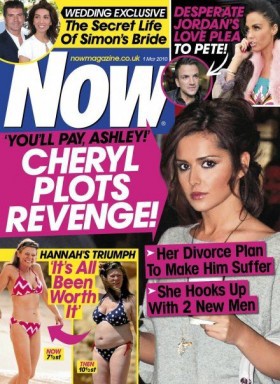
Cheryl’s shoddy treatment at the hands of “love rat Ashley,” as he will be known into perpetuity, lent the final, glimmering sheen to her image as Britain’s princess of the people. No longer simply an invincible, aspirational figure, she was now our favorite genre of tragic victim: gorgeous and famous but, like a banished Greek goddess, permanently marked by sorrow. Intensifying the nation’s empathy was Cheryl’s evident struggle over the decision to dump her errant husband — she stuck with him after the first lurid kiss-and-tell came out, and it took several years and several further humiliations until she walked away. At last it had become plain that, for the sake of her career, she couldn’t be seen to tolerate his behavior. Crucially, Svengali Simon Cowell, her mentor and boss on “The X Factor” — whom she’s called “the most charismatic man I’ve ever met, it’s like he’s trancing you” — was believed to be instrumental in last year’s quickie divorce. “She really loved [Ashley] and didn’t want to get divorced,” revealed the Black Eyed Peas’ Fergie, whose bandmate Will.i.am is Cheryl’s US manager and who knows from one’s husband banging strippers, “she just felt she had no choice.”
Scandalously, there was talk of remarriage this past summer, when Cheryl and Ashley began seeing each other again — one can’t help but wonder if, after she was dropped from “The X Factor” and therefore removed from the sphere of Cowell’s Jedi mind-control, Cheryl’s heart rebelled against its strictures. Mercifully, she came to her senses, although Ashley reportedly still hopes to “win her back” with a “10 carat sparkler.”
Frustratingly for Cheryl and for the legions of well-wishers willing her to stay away from Ashley, no other romances have stuck. Fate even seemed to punish her for the highly publicized yet faintly beardy relationship she had with “Dancing With the Stars” fixture Derek Hough: when they went on vacation to Tanzania in 2010, she contracted a serious strain of malaria and as a result almost died. By spooky coincidence, in the previous year Cheryl had climbed Mount Kilimanjaro to raise money for causes that included preventing malaria in Africa. (Could this be an attract-what-you-focus-on, The Secret-type phenomenon? Might we wake up tomorrow to news that Sean Penn is in an Iranian prison, or Ashton Kutcher has been sex trafficked? Dare to dream, I suppose.)
Cheryl is back to fighting fitness, you’ll be relieved to hear, and I don’t think it’s too dramatic to say that her life has reached a crossroads. Determined to make it in America with or without the backing of Simon Cowell, she’s bought a $5M apartment in Los Angeles, and wants to branch out into movies. It’s a fairly lofty goal: her only acting experience to date has been appearing in L’Oreal commercials as a face of the brand, plus her thick Geordie accent — allegedly one of the reasons she was dropped from “The X Factor” — will require softening. She did win a cameo role in the Cameron Diaz vehicle What To Expect When You’re Expecting but, sadly, her brief scene is said to be destined for the cutting-room floor. Not to worry: Cheryl still has her thriving music career, and her sound is sufficiently poppy and innocuous to appeal to the US mass-market. Maybe, just maybe, this vulnerable young woman with a $50M fortune, the beauty of Helen and more drive than a Tomahawk missile will somehow be okay.
Previously: Kerry Katona
Emma Garman no longer lives in her native UK, but she still watches lots of its TV.
Oh The Ways This New iPhone Will Completely (Not) Change Your Universe
by The Wirecutter
“Did you know today is the most important day of the year if you like new iPhones? Yes. You probably did because because people can’t stop writing and reading about this sort of thing; articles guessing what the new iPhone is All About make about are literally as popular as stories about Osama Bin Laden’s assassination and the Japanese Tsunami. At last! No more guessing! And no more patchwork articles about the guessing!
If you want to bear witness to the spectacle in a real time ‘play-by-play’ sports-nnouncer kind of way, you have come to the most incorrect place on earth.* I will be merely keeping a brief, dispassionate log about the new things that are to come in Next iPhone, and all the ways that it will and will not change your life.”
Nothing Weighs What It Used to Weigh!

Wait, did you see this horrifying thing on the kilogram, a measure of weight (yes, yes it is) that is actually tied to a real object? (Which affects the “pound,” as the pound is now basically defined as 0.45359237 kilograms!)
Familiarly known as Le Grand K and held in a vault just outside of Paris under three bell jars, it dates back to the 1880s, when it was forged by the British metallurgist George Matthey from an alloy of nine-tenths platinum and one-tenth iridium. As a metric unit, the kilogram is “equal to the mass of the international prototype,” according to the official definition. In other words, as metrologists like to point out, it has the remarkable property of never gaining or losing mass. By definition, any physical change to it alters the mass of everything in the cosmos…. But comparisons since the 1940s have revealed a troublesome drift. Relative to the témoins and to the national standards, Le Grand K has been losing weight — or, by the definition of mass under the metric system, the rest of the universe has been getting fatter.
Systems! Mass! Concepts gone wrong! The Earth-centric conflation of mass and weight! Entropy! DARK MATTER! ISOTOPE DRIFT! THE END OF TIME! LET’S GO BACK TO BED. (via)
